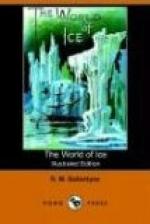During all this time the stars had been twinkling brightly in the sky, and the aurora shed a clear light upon the scene, while the air was still calm and cold; but a cloud or two now began to darken the horizon to the north-east, and a puff of wind blew occasionally over the icy plain, and struck with such chilling influence on the frames of the traffickers, that with one consent they closed their business for that day, and the Esquimaux prepared to return to their snow village, which was about ten miles to the southward, and which village had been erected by them only three days previous to their discovery of the ship.
“I’m sorry to find,” remarked the captain to those who were standing near him, “that these poor creatures have stolen a few trifling articles from below. I don’t like to break the harmonious feeling which now exists between us for the sake of a few worthless things, but I know that it does more harm than good to pass over an offence with the natives of these regions, for they attribute our forbearance to fear.”
“Perhaps you had better tax them with the theft,” suggested the surgeon; “they may confess it, if we don’t look very angry.”
A few more remarks were made by several of those who stood on the quarter-deck, suggesting a treatment of the Esquimaux which was not of the gentlest nature, for they felt indignant that their hospitality had been abused.
“No, no,” replied the captain to such suggestions, “we must exercise forbearance. These poor fellows do not regard theft in the same light that we do; besides, it would be foolish to risk losing their friendship. Go down, Meetuck, and invite Awatok and his wife, and half-a-dozen of the chief men, into the cabin. Say I wish to have a talk with them.”
The interpreter obeyed, and in a few minutes the officers of the ship and the chiefs of the Esquimaux were assembled in solemn conclave round the cabin table.
“Tell them, Meetuck,” said the captain, “that I know they have stolen two pieces of hoop-iron and a tin kettle, and ask them why they were so ungrateful as to do it.”
The Esquimaux, who were becoming rather alarmed at the stern looks of those around them, protested earnestly that they knew nothing about it, and that they had not taken the things referred to.
“Say that I do not believe them,” answered the captain sternly. “It is an exceedingly wicked thing to steal and to tell lies. White men think those who are guilty of such conduct to be very bad.”
“Ah, ye villain!” cried Saunders, seizing one of the Esquimaux named Oosuck by the shoulder, and drawing forth an iron spoon which he observed projecting from the end of his boot.
An exclamation of surprise and displeasure burst from the officers, but the Esquimaux gave vent to a loud laugh. They evidently thought stealing to be no sin, and were not the least ashamed of being detected. Awatok, however, was an exception. He looked grave and annoyed, but whether this was at being found out, or at the ingratitude of his people, they could not decide.




